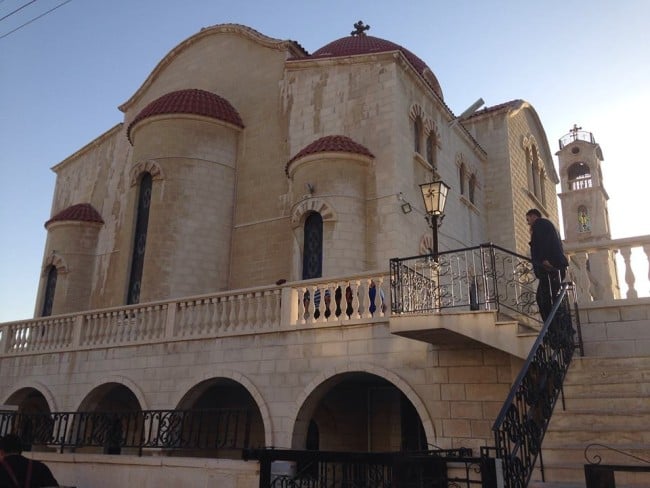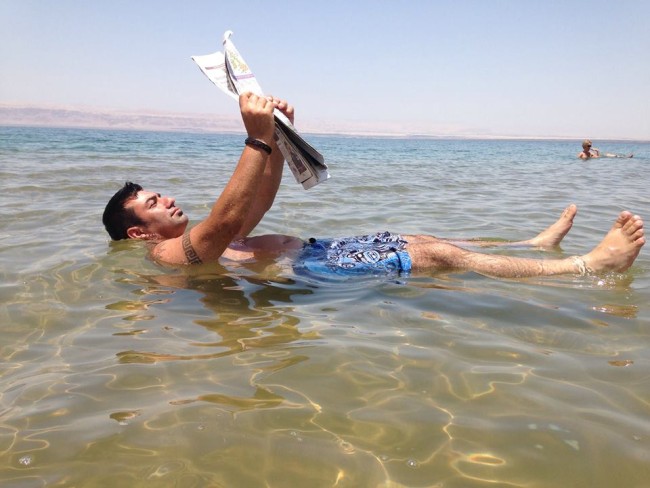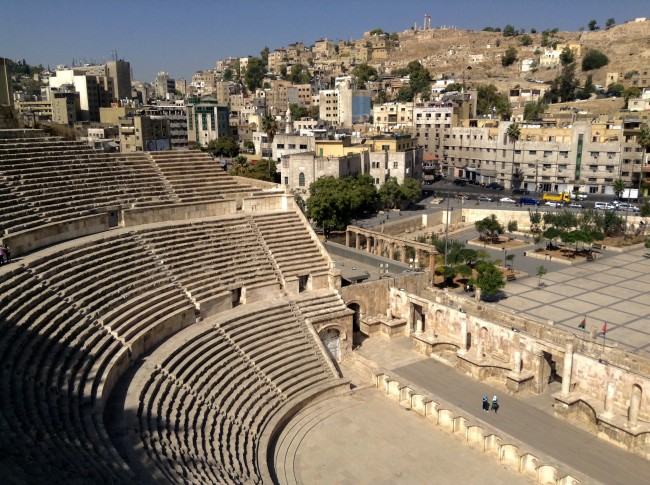As I was planning my trip to Jordan, a representative of the Greek Youth innocently pointed out, “you do realise it’s Ramadan here in Jordan!”. I had of course completely and utterly forgotten it was Ramadan.
Having experienced Ramadan in some of the ethnically-diverse suburbs of Sydney, one of the most multicultural cities in the world, I should have been ready for Ramadan in Jordan and its summer heat.
Arriving in the capital Amman, I kept thinking no one would be on the streets. It would be too quiet at this time of the year due to Ramadan and I would have the city to myself. The temperature was pushing 40 degrees, and camels were pushing themselves to the limit in what appeared to be a desert as my driver drove to the hotel. Camels, desert. And a camera that was not functioning. Not the start I had hoped for as a tourist. It did not matter, as it was the Greek speakers that I had actually come for.
Checking into the hotel, I soon made friends with the staff. Being within reasonable distance from the border with Israel and Palestine, I came to learn that most of the workers in the hotel were Palestinian. My new friends had heard of the Greek community in Jordan, and they knew enough about Greek speakers and Greek Orthodox in Palestine and Jerusalem. This was a good guide to the small imprint that Greeks have in the region.
During Ramadan, one does not consume drink or food in daylight hours outside your hotel. Any traveller should respect that; in turn, you will find that locals have a healthy respect for visitors. In fact, Jordan has around nine to 10 per cent Christians. Many are of the Greek Orthodox faith.

I was fascinated at how Amman slows down during the afternoon as the heat and observing Ramadan takes effect. When the fast is broken, the city centre comes alive, with street tables and eateries crammed. People are everywhere as they come together − not too dissimilar to Greece in summer. One evening, as dusk came into play, I was heartened by something beautiful. One small road was virtually blocked off as a long table, fitting around 40 people, perhaps more, began to break their fast. Most of them were men. What intrigued me was not the lack of sounds. It was the wonderful sight of everyone communicating with sign language, as most were deaf.
The nice warm welcome of Amman continued with my meeting of the Greek Youth. The evening of my arrival, I was greeted by around 25 people. The ages ranged from teenagers to 30 years old. Everyone was there to enjoy each other’s company, catch up and have a laugh. Gatherings such as these are informal.
The clubhouse is unique. Essentially like a small house, with a living room, a kitchen, office and a courtyard which was full of young people of Greek background. You could feel a warm Hellenic vibe.
I met a range of people, most born in Amman, though a couple of members of the parea were born in Greece, such as Vasilis Zoubas. They were living in Jordan to take advantage of business opportunities. Considering the condition of the Greek economy, it is admirable to find young people are having a crack at business internationally.
In some ways, that is reminiscent of the Greeks of antiquity, the Hellenistic era, Roman and Byzantine times, who all came across the east to make a new life and many to seek their fortunes.

I spoke with Katia Al-Hussban, who is the president of Greek Youth of Jordan, and some of the members of the group to find out more about their experiences.
Katia, an architect, is indicative of the young Greek people I have met in a number of Arabic countries. Proud of her Jordanian heritage, she is equally proud to be Greek and can speak several languages. Like most of her group, she was observing Ramadan. She explained that during Ramadan most people work fewer hours during the daytime, a relief to someone like me who can barely last an hour without a coffee or a snack!
Tarek Mauifa told me that there are up to 500 families of Greek descent in Amman and Jordan, “most of whom are Greek women married to Jordanian men who studied in Greece, predominantly in Thessaloniki in the 1970s”. Most of the women moved to Jordan circa 1980. There are perhaps 15 families in which both parents are Greek.
“There is a strong connection between the government of Greece and that of Jordan. The military undertake joint training for example, Greek products are well known as are plate-smashing traditions and there are very good relations at this level.”
What I learnt from the group is that their parents are respectful of both cultures. There is a strong connection to Jordanian and Greek customs, irrespective of where each of the parents was born. The boys were quick to point out that their mothers would chase them (as any Greek mum would) to learn Greek when they were children. The young people made the point that the culture will survive due to the strength of support at home. And Jordanians seem to know Sakis Rouvas!
The youth are passionate about their origins, with Sami Jaser telling me they have occasionally stepped up and taught Greek when there has been an absence of teachers from Greece. This itself is a problem for countries such as Jordan. The Greek crisis means that funding and support for teaching needs to be found to ensure certified Greek teachers come to Jordan to help the children.
The Greek women are the key drivers of the culture, and from the affection displayed by their kids, it is their passion and nurturing of the culture which is key to the future. Most of the women who represent the Greek Ladies of Jordan are from Thessaloniki. As anyone who has been to Thessaloniki will tell you, there is a certain friendliness and warmth displayed by the people there, a human trait that is evident in Jordan. Everyone seemed to be friendly to this foreigner, just as they are when I visit Thessaloniki. In fact, Jordan is a tolerant society of other cultures.
The Greek Ladies are led by Mrs Flora Varnali, who has been active, along with dozens of other women, in promoting her culture of birth, social gatherings and Greek language. It was through the lobbying efforts of the Greek Ladies that the Greek school emerged and teachers arrived from Greece.
It is hard to ascertain when the first Hellenes of what we now call Jordan permanently settled. Hellenes have traditionally stayed close to the confines of the Mediterranean and Black Sea when colonising or migrating. Jordan is of course inland. What we do know is that, just like some of the Greek speakers I met at the clubhouse, Hellenes traded in the area prior to the arrival of Alexander the Great. Alexander championed a fusion of his own Greek culture with that of the east; this was evident for many centuries across Asia.
The breakup of Alexander’s empire led to the establishment of various Hellenistic kingdoms. The Seleucid Kingdom, which encompassed the eastern part of Alexander’s empire, included Syria (312-63BC). The Greek empire of the Seleucids ruled over the area from Syria to parts of Pakistan, the unifying element being the Hellenic culture and administration that ruled over this vast region. The Greek language gained prominence, particularly in the larger cities and towns. Seleucus Niacator (The Victor) was the first ruler. No one can say for certain what it was that attracted him to this area, for it was a long way from Greece with very few Greek settlements in place. Subsequently, the reign of Seleucus and his successors witnessed an expansion of Greek cities, speakers and merchants.
A number of cities were founded, including Philadelphia, which means friends and brothers and sisters. The city is now Amman. Gerasa is now Jerash, Gedara is Umm Qays, Pella, which is taken from the birthplace of Phillip II and Alexander, is Tabaqat Fahl and Arbila became Irbid.
When Pompey of Rome conquered Syria and put an end to the Seleucid Empire, the Greek language and culture was still dominant and remained relevant until the Roman Empire was superseded by the Byzantine Empire in the fourth/fifth centuries AD. Byzantine rule meant that the people of the Levant were gradually converted to the Greek Orthodox religion.

One of the defining elements of Jordan is the site of Petra. In Greek, it means rock. The area and its distinct architecture were defined by the Nabataean people before the arrival of the ancient Hellenes. There were additions by the Seleucids as well as Byzantine churches.
Prior to the arrival of the Arab military machine in the seventh century, control of the Jordan area by Greek-speaking Byzantines was strong, despite the almost constant threat of neighbouring Sassanids (medieval Persia). The area was divided between Palestine Secunda and Arabia Petraea.
With the arrival of Arabs, a gradual conversion of local people resulted in a shift from Christianity to Islam. The Greek language too lost its importance, never to be regained.
Byzantine Greeks were responsible for at least 20 basilicas being established. I could not locate any on my visit, though I did visit a Greek Orthodox Church not far from my hotel, twice. The first time, it took me a few hours to walk what should have been a short distance. It is not a good idea to get lost walking in Ramadan as the few people about could not speak English or Greek! Eventually, I was able to witness a Greek Orthodox wedding which was filled with hundreds of guests and a Sunday mass. I managed to have a pleasant conversation with the priest in Greek to round out my trip.
Thirty-four kilometres from this church in Madaba, the Church of St George has existed since 1884. As divine intervention would have it, during the initial construction phase, the remains of a Byzantine church were discovered, including a mosaic and floor map of Palestine highlighting 157 biblical sites of the region. The mosaic, approximately 25 metres in length and six metres wide, is dated from AD560. A Greek school is located nearby, headed by Father Innokentios, and open to Greek and Muslim students. The church has over a dozen educational institutions across Jordan and is known as a quality provider of learning.
![]()
A mosaic and floor map of Palestine highlighting 157 biblical sites of the region.
As I caught my ride back to the airport with my Palestinian driver, I was in a thoughtful mood. Across Asia, the Greeks had once again achieved. From the founding of cities far from the Greek heartland to a parea of young people who seem destined to carry on the spirit of Alexander and Seleucis. Jordan has not been ‘Greek’ for well over a millennia, yet it still has traits of a Hellenic spirit and past.
* Billy Cotsis is the author of ‘From Pyrrhus to Cyprus: Forgotten and Remembered Hellenic Kingdoms, Territories, Entities & a Fiefdom’.